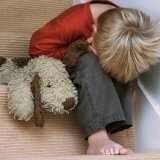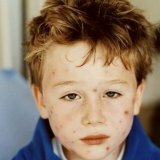Vomiting and diarrhea in children
 Most children have ever had diarrhea. In most cases, it is provoked by infections that do not stay in the child's body for a long time. Nevertheless, it is important to know what needs to be done to alleviate and even prevent diarrhea.
Most children have ever had diarrhea. In most cases, it is provoked by infections that do not stay in the child's body for a long time. Nevertheless, it is important to know what needs to be done to alleviate and even prevent diarrhea.
Vomiting and diarrhea in a child.
Diarrhea - loose or watery stool, is usually caused by infections, viruses, bacteria or parasites that live in the gastrointestinal tract. Vomiting or diarrhea is caused by various causes. For example, the cause may be contaminated water. In developed countries, this happens often. Also, the cause of diarrhea can be poorly processed food. In such cases, food poisoning occurs. Infections that cause diarrhea are highly contagious. These infections can be transmitted through:
- dirty hands
- contaminated food or water
- some
- pets direct contact with feces( ie, from the dirty diapers or toilet)
Children can get an infection that cause diarrhea, through various contaminated objects. It can be toys, changing tables, a toilet, even through the hands of the person who cooked food. Children can become infected by touching the contaminated surface( toilet or toy) and then putting their fingers in their mouths.
A frequent cause of diarrhea is viral gastroenteritis( called "gastric flu", it can also provoke nausea and vomiting).This disease can quickly spread through various public institutions, such as schools or kindergartens, because it is very contagious. Symptoms usually last only a few days. In affected children who can not get enough fluid, the body is dehydrated.
Rotavirus infection is a common cause of viral gastroenteritis in children. Rotavirus infection causes explosive, watery diarrhea, and not all symptoms will manifest. Outbreaks of rotavirus infection occur in the winter and in the first months of spring, especially in children's centers and children's hospitals. Another group of viruses that can cause diarrhea in children, especially in the summer months, is enteroviruses, in particular, the Coxsackie virus. Bacteria and parasites.
Many different types of bacteria and parasites can lead to diarrhea. Here are a few of which you may have heard:
- E. coli: the majority of intestinal infections are spread through contaminated food or water, such as unwashed fruits or vegetables.
- Salmonella: these bacteria( found in contaminated raw or poorly prepared eggs or chicken meat) are the main cause of food poisoning, especially in the summer.
- Shigella( shigellosis): rapidly distributed in families, hospitals and kindergartens. Children from 2 to 4 years old are most susceptible to infection. Giardia
- : Infection with Giardia child( also called giardiasis) may easily occur through contaminated water, especially swimming pools and water parks( bacteria resistant to chlorine).
- Cryptosporidium( cause cryptosporidiosis): these bacteria live in drinking water. This parasite is often responsible for epidemics of diarrhea in children's centers and other public places. Cryptosporidiosis often causes watery diarrhea, which can last for 2 weeks or more.
Diarrheal infections are a normal part of childhood for many children, but diarrhea can be a symptom of a number of non-infectious diseases, especially if it lasts several weeks or longer. This may indicate food allergy or gastrointestinal disease, such as celiac disease or inflammatory bowel disease.
Signs and symptoms of diarrhea.
Symptoms usually begin with abdominal cramps, then diarrhea begins, which usually lasts no more than a few days. Infections, viruses, bacteria and parasites that cause diarrhea in children, can cause other symptoms such as:
- fever
- loss of appetite
- nausea
- vomiting
- weight loss
- dehydration
In the case of viral gastroenteritis, often develops a fever and vomiting in the child, andThen diarrhea is already beginning.
Warning.
Although it is almost impossible to prevent, but children get infections that cause diarrhea, here are some tips to help reduce the risk of infection:
- Make sure that children wash their hands well and often, especially after going to the toilet and before eating. Hand washing is the most effective way of preventing diarrheal infections that are transmitted from person to person. Dirty hands carry infectious germs into the body when children gnaw nails, suck fingers and eat with fingers.
- Keep the bathroom clean to prevent the spread of infectious germs.
- Wash fruits and vegetables well before eating, as food and water can also be carriers of infectious germs.
- Flush kitchen utensils well after they have been in contact with raw meat, especially poultry.
- Do not drink from streams, springs, or lakes. It is safer to drink filtered or bottled water and other beverages, rather than tap water. Also, extreme care should be taken when buying ready-made products from street vendors. Do not wash cages or bowls of animals in the same sink in which you wash dishes or food.
Call a doctor if the child is under 6 months of diarrhea or has:
- severe or prolonged diarrhea
- fever
- vomiting and refusal to drink
- severe abdominal pain
- diarrhea that contains blood or mucus
Call a doctor immediately ifyour child is dehydrated. Signs of dehydration include:
- dry and sticky mouth
- little or no tears during crying
- lack of urine or wet diapers from 6 to 8 hours( or only a very small amount of dark yellow urine)
- no urine for 12 hours atolder child
- dry cool skin
- lethargy or irritability
- fatigue or dizziness in an older child
Treatment.
With mild diarrhea, there is usually no cause for concern until your child drinks and eats normally. Mild diarrhea usually occurs within a few days, and the children recover completely at home. With such diarrhea, rest and a large amount of fluid are needed.
Antibiotics and antiviral drugs are not provided for cases with diarrhea caused by bacteria and viruses, because most children recover on their own. But antibiotics are sometimes given to young children or people with a weakened immune system to prevent the spread of bacterial infection( eg, salmonella) throughout the body.
If the disease is caused by a parasite, it can be treated with antiparasitic medicines. The doctor can take a feces analysis, which is studied in the laboratory to find out which specific embryos cause diarrhea( bacteria, viruses or parasites).



